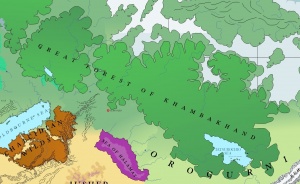Khambakhand

Khambakhand, more commonly known as the Great Forest of Khambakhand, is a great region in north-eastern Asdauria, covered with boreal forests and swamps which rests south of the tundra region just before the Boreal Ocean around the north pole. To the west of the Khambakhand are the woodlands of Osfandia which share many of the same fauna and flora. Included within the Khambakhand is the Sea of Sleeping Gods and part of Orogurnia. Most of Khambakhand is a trackless forest and populated with all manner of wild beasts and humanlikes. There are however, some indigenous human tribes who practice a shamanic religion and rely on a hunter-gatherer lifestyle. Most of Khambakhand remains uncharted, especially since it lies outside of any reliable caravan or merchant routes. Eastern Khambakhand rests north of the Shwok Shanya Mountains of Sungo and there are many Sungotine folktales about the great woodland. Much of our modern knowledge about this region comes from Ariglas dhal Cethaig, an Asbardian who explored parts of the forest in the late twenty sixth and early twenty seventh centuries.
Explorer Ariglas dhal Cethaig
The first documented knowledge that is regarded as trustworthy was provided by the Asbardian explorer, Ariglas dhal Cethaig, who explored and subsequently lived in the Great Forest of Khambakhand for nearly five years on two explorations, one in the very late twenty sixth century (ca 2597 to 2599) and a second in the very early twenty seventh century (ca 2603 to 2606). He relied on skycraft to bring him and his team to edge of the forest and then explored the woodland area on foot. His team dealt with trolls, ogres, and indigenous humans. Geddamin Giants and other creatures were spotted.
Indigenous Humans
The indigenous humans of Khambakhand are suspected of being descended from the ancient Djimya and Issathazian ethnic groups. Some scholars believe they may be from a previous human diaspora over twenty thousand years ago.
See Also
| This article is a stub. It requires further development by the creator. |